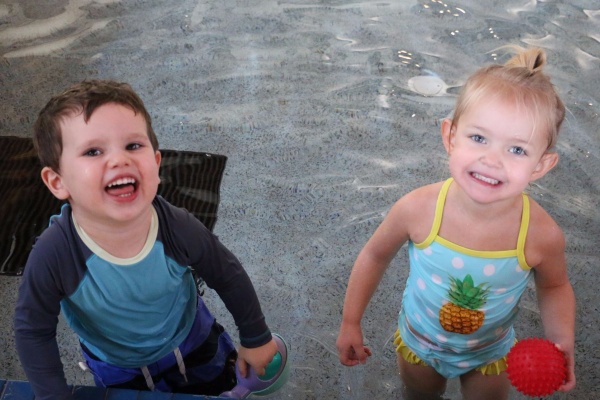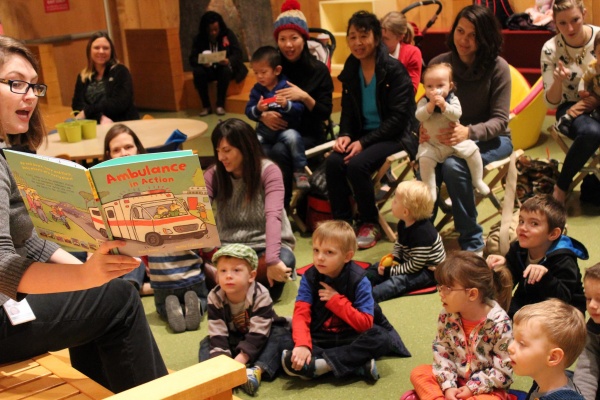
How Kids Can Be As Good at Home as They Are at School
A few weeks ago on The Middle, Frankie and Mike were frustrated they were on the receiving end of their teenage son’s snotty attitude and temper while perfect strangers were treated with politeness and respect.
frustrated they were on the receiving end of their teenage son’s snotty attitude and temper while perfect strangers were treated with politeness and respect.
I feel their pain. Except our teenage son is a two-year-old little girl.
KT is knee-deep in the terrible twos and has been since she turned one. As much as we adore her and as sweet as she can be, the kid has the strength of Mike Tyson and the temper to match, and uses both when she wants some fruitsnacksrightNOW!!!
When my husband and I went to our daughter’s first parent/teacher conference, we were prepared for the worst. Since she started going there in May, we received negative feedback only once, but were waiting for a file folder of incidence reports to drop in our laps.
“First of all,” started her teacher. “Let me just say KT is a delight.”
“We call her Mother Hen around here. When someone gets hurt, she’s always the first one there to help.” (Reality – KT does apologize to her sister after she punches her but before she shoves her into a wall).
“She’s always picks up when she’s told to.” (Reality – the other night, we were treated to a toothpaste fountain squeezed from two tiny fists and a bowl of ice cream hurled across the living room like a Chris Carpenter fastball).
“KT’s just a sweet little girl.” (Reality – she is sweet. After two hours of temper tantrums each night, she does say, “I love you mommy” before she throws a temper tantrum for another hour in bed).
The conference was bittersweet. On one hand, we were thrilled KT is thriving at her daycare. On the other – and the reason I started sobbing in the car on the way home – how come that sweetness doesn’t extend to us in the evenings?
In other words, what’s behind this Jekyll and Hyde phenomenon in kids?
The recipe for a behavior blowup
According to St. Louis child development expert Dr. Sophia Pierroutsakos, by the time kids enter preschool, they already understand social pressure and the emotions of shame and embarrassment that come when misbehaving in a public setting. So when a toddler saves that melt down for mom and dad in private, it’s actually the sign of a strong bond between the child and the parent.
“After being on your best behavior for eight or nine hours, you tend to let loose with the people you feel most safe with,” she remarked. “It’s a sign of trust and security – when you feel safe, you can show your worst self. At 42, I still do it with my mom. If something’s slightly off, I’ll take it on my mom because I can. I knew it at two and I know it at 42 – my mom will love me even when I’m a brat. I’m not 100% sure the people I work with would feel the same.”
It’s a valid point. I would never yell at a coworker over a serious blunder, but when Mr. P leaves empty hangers interspersed among his shirts, a blast of curse words that would make Ice-T and Ice Cube blush erupts from my mouth. So I can’t be surprised my two-year-old feels the same way. The issue is how to prevent that security from morphing into anarchy.
Dr. Pierroutsakos noted three ways we as parents can ease the transition from school to home:
-
Find out what happened that day. I’ll admit it – I’ll take KT’s daily report from the teacher and toss it into my purse without a glance. However, according to Dr. Pierroutsakos, I might be missing out on factors that could impact her behavior the rest of the evening. “Ask the teacher what the highlights and lowlights were for the day so you can be prepared. If she didn’t get a nap or eat lunch, it’s probably not a good idea to run to Target. On another night, she might need to go to the park to let off some steam before heading home.”
-
Be predictable. At daycare or school, kids have a structured environment. It’s important to maintain a comparable level of predictability when transitioning from school to home. In other words, save errands for your lunch hour or before you pick the kids up for the evening. Dr. Pierroutsakos suggested establishing a routine of quiet activities to help everyone decompress once you get home, such as having a healthy snack and snuggling in a rocking chair to talk about that day. Those few minutes of relaxation will provide you the freedom the rest of the night to make dinner, help with homework, play games and run baths with limited temper tantrums.
- Give yourself a break. Planning ahead and reducing commitments can go a long way in reducing problems with the kids. But just as important, let your short fuse burn out before the evening pick-up. “We forget that’s we’re a little bit like Jekyll and Hyde ourselves. We’ve had to manage our behavior all day too. So after a long day, sometimes we’re the brats in the family – we may be making the situation worse than it has to be. Take a little time for yourself before picking the kids up, even if it’s just some quiet time in your car. Be aware that everyone has had a long day.”
For our family, it’s been an on-going process. We’re trying to be better, but when I see a mound of dishes and hear the growling in my stomach when I walk in the door, it’s hard not to hit the kitchen. But I’m slowly learning that a quiet transition is essential for KT’s happiness and my sanity.
And for turning a two-year-old Mr. Hyde back into Dr. Jekyll.
By Nicole Plegge, Lifestyle Blogger for SmartParenting

Metro East mom Nicole Plegge has written for STL Parent for more than 12 years. Besides working as a freelance writer & public relations specialist, and raising two daughters and a husband, Nicole's greatest achievements are finding her misplaced car keys each day and managing to leave the house in a stain-free shirt. Her biggest regret is never being accepted to the Eastland School for Girls. Follow Nicole on Twitter @STLWriterinIL





















